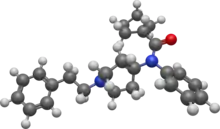Cyclopentylfentanyl
Cyclopentylfentanyl is an opioid analgesic that is an analog of fentanyl and has been sold online as a designer drug, mainly in Sweden and other Scandinavian countries.[1][2]
 | |
 | |
| Legal status | |
|---|---|
| Legal status |
|
| Identifiers | |
IUPAC name
| |
| CAS Number | |
| PubChem CID | |
| ChemSpider | |
| UNII | |
| Chemical and physical data | |
| Formula | C25H32N2O |
| Molar mass | 376.544 g·mol−1 |
| 3D model (JSmol) | |
SMILES
| |
InChI
| |
Side effects
Side effects of fentanyl analogs are similar to those of fentanyl itself, which include itching, nausea and potentially serious respiratory depression, which can be life-threatening. Fentanyl analogs have killed hundreds of people throughout Europe and the former Soviet republics since the most recent resurgence in use began in Estonia in the early 2000s, and novel derivatives continue to appear.[3] A new wave of fentanyl analogues and associated deaths began in around 2014 in the US, and have continued to grow in prevalence; especially since 2016 these drugs have been responsible for hundreds of overdose deaths every week.[4]
Legal status
Cyclopentylfentanyl was made illegal in Sweden in January 2017.[5]
Cyclopentylfentanyl is a Schedule I controlled drug in the USA since 1 February 2018.[6]
See also
References
- Helander A, Bäckberg M, Signell P, Beck O (2017). "Intoxications involving acrylfentanyl and other novel designer fentanyls - results from the Swedish STRIDA project". Clin Toxicol. 55 (6): 589–599. doi:10.1080/15563650.2017.1303141. PMID 28349714. S2CID 11978059.
- Zawilska JB (2017). "An Expanding World of Novel Psychoactive Substances: Opioids". Front Psychiatry. 8: 110. doi:10.3389/fpsyt.2017.00110. PMC 5492455. PMID 28713291.
- Jane Mounteney; Isabelle Giraudon; Gleb Denissov; Paul Griffiths (July 2015). "Fentanyls: Are we missing the signs? Highly potent and on the rise in Europe". International Journal of Drug Policy. 26 (7): 626–631. doi:10.1016/j.drugpo.2015.04.003. PMID 25976511.
- Armenian P, Vo KT, Barr-Walker J, Lynch KL (2017). "Fentanyl, fentanyl analogs and novel synthetic opioids: A comprehensive review" (PDF). Neuropharmacology. 134 (Pt A): 121–132. doi:10.1016/j.neuropharm.2017.10.016. PMID 29042317. S2CID 21404877.
- Fem nya ämnen klassas som narkotika. Publicerat 25 Januari 2017
- "Schedules of Controlled Substances: Temporary Placement of Seven Fentanyl-Related Substances in Schedule I". Federal Register. 1 February 2018.